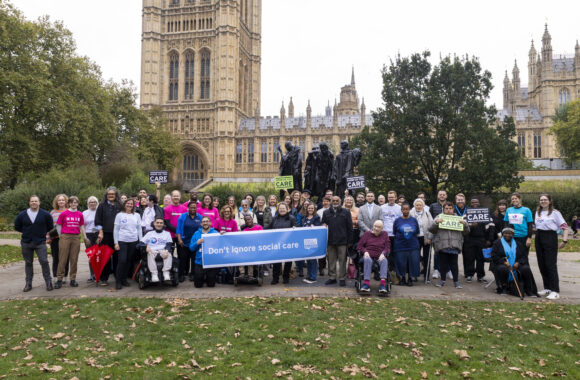
Customers and staff from Look Ahead's Berkshire Homelessness and Complex Needs service.
Friday 1 September is Starts at Home Day, the day celebrates the difference that having somewhere safe to call home, together with care and support services can make to a person’s life.
This year, the focus is on the importance of supported housing services. Supported accommodation is of course at the heart of why Look Ahead – now in our 50th year – exists, and the role we play for communities and individuals across London and the South East.
As a specialist social care and housing services provider, we see the benefits of supported housing daily. But don’t just take our word for it, research commissioned by the National Housing Federation has shown that across England: “Were it not for supported housing, there would be an increase in core homelessness of around 41,000 people, with a further 30,000 people at significant risk of future homelessness”.
It’s not only about keeping rooves over heads either, supported housing often helps a person to recover from a mental health crisis or the experience of homelessness, and get their lives back on track. In other circumstances supported housing means individuals with a learning disability can enjoy a more independent life, and be active members of their communities, rather than residing within secure hospital settings far from their families and loved ones.
With this in mind, we are joining the Starts at Home call for a commitment to long-term funding for supported housing. We need the government to:
- Ring-fence and increase long-term funding revenue for housing-related support, and ensure it matches, or exceeds, the £1.6bn per year allocated to English authorities in 2010.
- Reinstate the £300m Housing Transformation Fund, to ensure that social care and supported housing are integrated.
- Commit investment in social housing to make sure residents who move on from supported housing have a safe, affordable place to live.
- Ensure funding for effective partnership working between supported housing, the NHS and social care.
- Ensure the Social Care White Paper’s call to ‘make every decision about care a decision about housing’ becomes a reality.
There are plenty of reasons why the government should support these asks, from the way in which supported housing can facilitate joined-up care through partnerships that lead to better individual outcomes, to the great savings they can offer public services as an alternative to hospital admissions.
Our services demonstrate these benefits in very tangible ways, take our Edward Alsop Court homelessness hostel service in Westminster for example. The service supports men who have experienced homelessness, and who have a variety of needs, including alcohol and substance misuse, mental and physical health needs, and frailty. Over the years, our staff team has built partnerships with Westminster Council, local NHS services and voluntary sector organisations to meet these in the best way possible. Our staff have even set up an onsite clinic with NHS nurses four days a week, and both a GP and social worker make weekly visits to the service.
They didn’t stop there either; they bring in psychologists and an art therapist to support customers with their mental health too. They also brought in Turning Point and Change Grow Live, to offer advice and support with substance misuse and dependency. Without our dedicated support worker team, and the hostel building itself offering a venue, it would have been much harder for customers to engage with the all-encompassing support they needed.
Then there’s our Tower Hamlets Crisis House service that supports people in mental health crisis. Crisis House offers an alternative to hospital admission for some people, and a step-down for others who no longer need psychiatric in-patient care. The service is delivered in partnership with the East London Foundation NHS Trust (ELFT) and is a key part of the local acute mental health care pathway.
There, individuals can continue with clinical care from the ELFT Home Treatment Team, whilst also getting a range of support from Look Ahead staff including benefits applications, appointment management, professional or educational development, medication, and more, before they return home or move into lower acuity supported housing. Crisis House ensures customers’ needs continue to be met in a homely, community-based environment, while crucially freeing up spaces on the local hospital ward.
That’s not the only benefit either. By our own conservative estimates, the present cost of an adult acute bed is approximately £500 per day, a Crisis House bed, meanwhile, costs just under £200 per day. When totalled up, this amounts to an estimated saving of £2,100 per person to the NHS each week, saving vital resources.
Ahead of next year’s likely elections, it is crucial that politicians are made aware of the value that supported housing can offer, first and foremost, to the individuals who engage with services, and secondly, to the UK’s already strained public finances.

